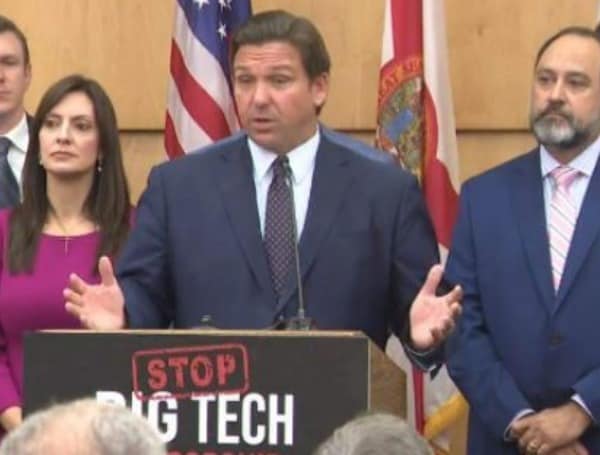Florida Gov. DeSantis Announcing Big Tech Lawsuit (TFP File) The U.S. Supreme Court will hear arguments on Feb. 26 in a First Amendment fight abou
The U.S. Supreme Court will hear arguments on Feb. 26 in a First Amendment fight about a 2021 Florida law that placed restrictions on large social media companies.
The Supreme Court issued a schedule Friday that included the case.
Florida went to the Supreme Court after the 11th U.S. Circuit Court of Appeals kept in place most of a preliminary injunction that U.S. District Judge Robert Hinkle issued against the law in 2021.
Read: Trump Crushes Gov. DeSantis Among Republicans In Crucial Florida County: POLL
Gov. Ron DeSantis made a priority of passing the law after Twitter, now known as X, and Facebook blocked former President Donald Trump from their platforms after Trump supporters stormed the U.S. Capitol on Jan. 6, 2021.
The law, in part, would prevent large platforms from banning political candidates from their sites and require companies to publish — and apply consistently — standards about issues such as banning users or blocking their content.
Companies could face penalties for violating restrictions in the law. For example, companies that remove political candidates from platforms could face fines of $250,000 a day for statewide candidates and $25,000 a day for other candidates.
Read: 10 Big Florida Legal Issues To Watch In 2024
The industry groups NetChoice and the Computer & Communications Industry Association challenged the constitutionality of the law, leading to the injunction. Hinkle described the law as “riddled with imprecision and ambiguity.”
The Supreme Court on Feb. 26 also will take up a challenge to a similar Texas law.
Android Users, Click To Download The Free Press App And Never Miss A Story. Follow Us On Facebook and Twitter. Sign up for our free newsletter.
We can’t do this without your help. Visit our GiveSendGo page and donate any dollar amount; every penny helps.

